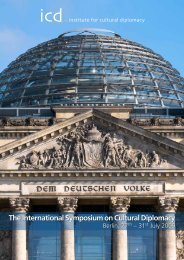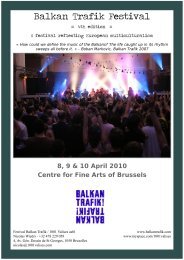- Page 2 and 3: Anniversaries are not about the pas
- Page 4 and 5: Pre-forum Articles about CEE Civil
- Page 6 and 7: About the Civil Society Forum - wha
- Page 8 and 9: About the Civil Society Forum - wha
- Page 10 and 11: Who represents the citizen in CEE i
- Page 12 and 13: Who represents the citizen in CEE i
- Page 14 and 15: Who represents the citizen in CEE i
- Page 16: Who represents the citizen in CEE i
- Page 19 and 20: Who represents the citizen in CEE i
- Page 21 and 22: Who represents the citizen in CEE i
- Page 23: Who represents the citizen in CEE i
- Page 27 and 28: Harnessed and unharnessed energies
- Page 30 and 31: Harnessed and unharnessed energies
- Page 32 and 33: Harnessed and unharnessed energies
- Page 34 and 35: • In the uncompleted spheres of r
- Page 36 and 37: Inspiring active citizensWhat trigg
- Page 38 and 39: Inspiring active citizensA lost bat
- Page 40 and 41: Inspiring active citizensTechnology
- Page 42 and 43: Inspiring active citizensActivism f
- Page 44 and 45: Inspiring active citizensReshapingt
- Page 46 and 47: Inspiring active citizensWe needpeo
- Page 48 and 49: Inspiring active citizensDirect goa
- Page 50 and 51: Citizens and PoliticsAre the ballot
- Page 52 and 53: Citizens and PoliticsWhen it comes
- Page 54 and 55: Citizens and Politicstime people we
- Page 56 and 57: Citizens and PoliticsMod: Are you s
- Page 58 and 59: Citizens and PoliticsReclaimthe pow
- Page 60 and 61: Citizens and Politicser times packa
- Page 62 and 63: Citizens and PoliticsProducingthous
- Page 64 and 65: Citizens and Politicsindividual thi
- Page 66 and 67: NGOs and the state- a relationship
- Page 68 and 69: NGOs and the state3 levelsof state:
- Page 70 and 71: NGOs and the stateThe stateis madeb
- Page 72 and 73: NGOs and the statemay split, someti
- Page 74 and 75:
NGOs and the staterepresentatives o
- Page 76 and 77:
NGOs and the statethe states are au
- Page 78 and 79:
NGOs and the stateLitigationcase fo
- Page 80 and 81:
Keeping up with the changing worldM
- Page 82 and 83:
Keeping up with the changing worldA
- Page 84 and 85:
Keeping up with the changing worldM
- Page 86 and 87:
Civil society, old media, and cyber
- Page 88 and 89:
Civil society, old media, and cyber
- Page 90 and 91:
Civil society, old media, and cyber
- Page 92 and 93:
Civil society, old media, and cyber
- Page 94 and 95:
Civil society, old media, and cyber
- Page 96 and 97:
Civil society, old media, and cyber
- Page 98 and 99:
Business and civil societyBusiness
- Page 100 and 101:
Business and civil societyholders,
- Page 102 and 103:
Business and civil societySmalldiff
- Page 104 and 105:
Business and civil societybe indepe
- Page 106 and 107:
Business and civil societyClear div
- Page 108 and 109:
Business and civil societythe benef
- Page 110 and 111:
What about the future?Our world is
- Page 112 and 113:
What about the future?The problemof
- Page 114 and 115:
What about the future?people that h
- Page 116:
What about the future?future is a p
- Page 119 and 120:
What about the future?Experts areno
- Page 121 and 122:
What about art and civil societyArt
- Page 123 and 124:
Two decades of Civil Society in Cen
- Page 125 and 126:
125
- Page 127 and 128:
127
- Page 129 and 130:
During spring of 2009 focus groups
- Page 131 and 132:
Party politicsLocal levelControl fu
- Page 133 and 134:
Empty termSociety of citizensRespon
- Page 135 and 136:
So, the Internet offers the conditi
- Page 137 and 138:
Both GroupsSummary - civil society
- Page 139 and 140:
P 3: There are big successes. I thi
- Page 141 and 142:
Another participant expressed the v
- Page 143 and 144:
The weaknesses - which important pr
- Page 145 and 146:
P 2: IDIOT - in ancient Greece this
- Page 147 and 148:
contrary to participation.Mod + P 4
- Page 149 and 150:
Group 2Obviously, from the inside o
- Page 151 and 152:
ture and know-how, but also provide
- Page 153 and 154:
ut this is currently a very much un
- Page 155 and 156:
funding. Other participants conside
- Page 157 and 158:
What are the changes and trends tha
- Page 159 and 160:
P 2: There is definitely a need for
- Page 161 and 162:
During the summer of 2009 a street
- Page 163 and 164:
What a question! I don’t know wha
- Page 165 and 166:
Is democracy working in our countri
- Page 167 and 168:
Woman: It’s not how we imagined.
- Page 169 and 170:
If you have a problem in your commu
- Page 171 and 172:
First thing I do is to call 112 (th
- Page 173 and 174:
Have you ever volunteered for a civ
- Page 175 and 176:
No, I haven’t. I’ve never been
- Page 178 and 179:
In times when producing texts an
- Page 180 and 181:
goskie Przedmiescie are on socia
- Page 182 and 183:
Tanya Grishkovskaya - We can be
- Page 185 and 186:
Social Innovation CampCentral and E
- Page 187 and 188:
willing to invest a at least a day
- Page 189 and 190:
What ails civil society?What ails c
- Page 191 and 192:
What ails civil society?False assum
- Page 193 and 194:
What ails civil society?Women’s P
- Page 195 and 196:
Being a citizen - not a profession
- Page 197 and 198:
Being a citizen - not a profession
- Page 199 and 200:
Being a citizen - not a profession
- Page 201 and 202:
Civil society in Poland - some rema
- Page 203 and 204:
Civil society in Poland - some rema
- Page 205 and 206:
A hitchhiker’sguide tophilanthrop
- Page 207 and 208:
A hitchhiker’s guide to philanthr
- Page 209 and 210:
A hitchhiker’s guide to philanthr
- Page 211 and 212:
A hitchhiker’s guide to philanthr
- Page 213 and 214:
A hitchhiker’s guide to philanthr
- Page 215 and 216:
Concern + trust = hopeIn early 1990
- Page 217 and 218:
Concern + trust = hopethem on groun
- Page 219 and 220:
Concern + trust = hopeCodru Vrabiei
- Page 221 and 222:
Notes on the State of Civil Society
- Page 223 and 224:
Notes on the State of Civil Society
- Page 225 and 226:
Crisis accumulation and signs of re
- Page 227 and 228:
Crisis accumulation and signs of re
- Page 229 and 230:
Crisis accumulation and signs of re
- Page 231 and 232:
Civil Society 2.0?Civic organizatio
- Page 233 and 234:
Civil Society 2.0?There are also ne
- Page 235 and 236:
Istvan Rev suggests that we have to
- Page 237 and 238:
portunity to face history either on
- Page 239 and 240:
Isván Révstudied at Eötvös Lor
- Page 241 and 242:
The current quandaries of NGOs in C
- Page 243 and 244:
The current quandaries of NGOs in C
- Page 245 and 246:
The current quandaries of NGOs in C
- Page 247 and 248:
From democracy to kleptocracyand ba
- Page 249 and 250:
From democracy to kleptocracy and b
- Page 251 and 252:
From democracy to kleptocracy and b
- Page 253 and 254:
“The sleeping giant”- the churc
- Page 255 and 256:
“The sleeping giant” - the chur
- Page 257 and 258:
“The sleeping giant” - the chur
- Page 259 and 260:
“The sleeping giant” - the chur
- Page 261 and 262:
Representation is “out” - young
- Page 263 and 264:
are examples of small groups coo
- Page 265 and 266:
good, and the rise of the neo-li
- Page 267 and 268:
The policy of small stepsWhen an as
- Page 269 and 270:
The policy of small stepscreate a s
- Page 271 and 272:
The policy of small stepswhere inha
- Page 273 and 274:
The policy of small stepsThe societ
- Page 275 and 276:
Redefining NGOsSure people know abo
- Page 277 and 278:
Redefining NGOsyears? Would shiftin
- Page 279 and 280:
Civil Society - always a good thing
- Page 281 and 282:
Civil Society - always a good thing
- Page 283 and 284:
2 voices from the sidelinesLast wee
- Page 285 and 286:
2 voices from the sidelinesTwo week
- Page 287 and 288:
eParticipation- a newsphere of NGOa
- Page 289 and 290:
eParticipation - a new sphere of NG
- Page 291 and 292:
eParticipation - a new sphere of NG
- Page 293 and 294:
A new dissident civil society: hot
- Page 295 and 296:
A new dissident civil society: hot
- Page 297 and 298:
A new dissident civil society: hot
- Page 299 and 300:
A new dissident civil society: hot
- Page 301 and 302:
A new dissident civil society: hot
- Page 303 and 304:
Give a Book for Christmas a short s
- Page 305 and 306:
and stop being the consumers who dr
- Page 307 and 308:
the accumulation of capital. In it
- Page 309 and 310:
how at one time when they were take
- Page 311 and 312:
count at PKO 1 ! If you want a flat
- Page 313 and 314:
a break from writing. I did not exp
- Page 315 and 316:
Thanks to all the inspiring people





